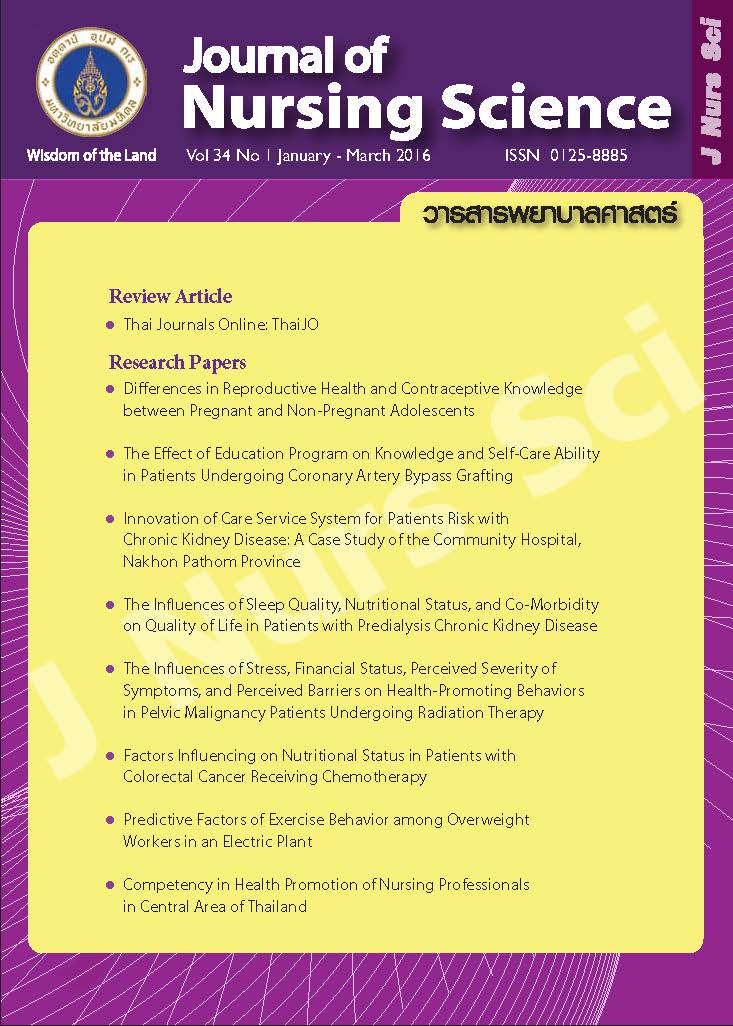The Influences of Stress, Financial Status, Perceived Severity of Symptoms, and Perceived Barriers on Health-Promoting Behaviors in Pelvic Malignancy Patients Undergoing Radiation Therapy
Main Article Content
Abstract
Purpose: To study health-promoting behaviors and the influences of stress, financial status, perceived severity of symptoms, and perceived barriers on health-promoting behaviors in pelvic malignancy patients undergoing radiation therapy.
Design: A correlational predictive study.
Methods: The study sample comprised 86 patients with pelvic malignancies who were receiving radiation therapy at one University Hospital in Bangkok. The sample was selected using purposive sampling, and questionnaires were used in collecting data including 1) the personal data form including financial status 2) perceived severity of symptoms questionnaire 3) ST-5 stress questionnaire 4) perceived barriers to health-promoting behaviors questionnaire and 5) Health Promoting Lifestyle Profile II. Data were analyzed by descriptive statistics and multiple regression analysis.
Main findings: The average score of health-promoting behaviors was 157.58 points (M = 3.03, SD = 2.70). The multiple regression analysis revealed that all independent variables could jointly explain 78.5 % of variance in health-promoting behaviors with statistical significance (R2 = .785, F(4, 81) = 73.763, p < .001). Three factors were found as predictors of health-promoting behaviors which included perceived severity of symptoms (β = - .456, p < .001), stress (β = - .268, p < .01) and perceived barriers to health-promoting behaviors (β = - .235, p < .05).
Conclusion and recommendations: The researchers suggest that nurses should be encouraged to adopt health-promoting behaviors in pelvic malignancy patients undergoing radiation therapy. Assessing their stress, helping them to manage the symptoms and reduce perceived barriers to practice of health-promoting behaviors would improve the patient’s treatment outcomes and their quality of life.
อิทธิพลของความเครียด สถานภาพทางการเงิน การรับรู้ความรุนแรงของอาการ และการรับรู้อุปสรรคต่อพฤติกรรมสร้างเสริมสุขภาพในผู้ป่วยมะเร็งอุ้งเชิงกรานขณะได้รับรังสีรักษา
บทคัดย่อ
วัตถุประสงค์ ศึกษาพฤติกรรมสร้างเสริมสุขภาพ และอิทธิพลของความเครียด สถานภาพทางการเงิน การรับรู้ ความรุนแรงของอาการ และการรับรู้อุปสรรค ต่อพฤติกรรมสร้างเสริมสุขภาพในผู้ป่วยมะเร็งอุ้งเชิงกรานขณะได้รับรังสีรักษา
รูปแบบการวิจัย: การศึกษาความสัมพันธ์เชิงทำนาย
วิธีดำเนินการวิจัย: กลุ่มตัวอย่างเป็นผู้ป่วยมะเร็งอุ้งเชิงกรานขณะได้รับรังสีรักษาที่เข้ารับการรักษาในโรงพยาบาล มหาวิทยาลัยแห่งหนึ่งในกรุงเทพมหานคร จำนวน 86 ราย ใช้วิธีเลือกกลุ่มตัวอย่างแบบเจาะจง รวบรวมข้อมูล โดยใช้ 1) แบบสอบถามข้อมูลส่วนบุคคล รวมสถานภาพทางการเงิน 2) แบบสอบถามการรับรู้ความรุนแรงของอาการ 3) แบบสอบถามความเครียด ST-5 4) แบบสอบถามการรับรู้อุปสรรคในการปฏิบัติพฤติกรรมสุขภาพ และ 5) แบบสอบถามการปฏิบัติพฤติกรรมสร้างเสริมสุขภาพ วิเคราะห์ข้อมูลโดยใช้สถิติเชิงพรรณนา และการวิเคราะห์อำนาจ การทำนายโดยใช้สถิติวิเคราะห์ถดถอยพหุคูณ
ผลการวิจัย: คะแนนพฤติกรรมสร้างเสริมสุขภาพโดยรวมเฉลี่ย 157.58 คะแนน (M = 3.03, SD = 2.70) ตัวแปรอิสระทั้งหมดสามารถร่วมอธิบายความผันแปรของพฤติกรรมสร้างเสริมสุขภาพของกลุ่มตัวอย่างได้ร้อยละ 78.5 (R2 = .785, F(4, 81) = 73.763, p < .001) โดยพบว่าปัจจัยที่มีอิทธิพลต่อพฤติกรรมสร้างเสริมสุขภาพอย่างมีนัยสำคัญทางสถิติ ได้แก่ การรับรู้ความรุนแรงของอาการ (β = - .456, p < .001) ความเครียด (β = - .268, p < .01) และการรับรู้อุปสรรคในการปฏิบัติพฤติกรรมสร้างเสริมสุขภาพ (β = - .235, p < .05)
สรุปและข้อเสนอแนะ: ผู้วิจัยเสนอแนะว่าพยาบาลควรการปฏิบัติพฤติกรรมสร้างเสริมสุขภาพในผู้ป่วย มะเร็งอุ้งเชิงกรานขณะได้รับรังสีรักษา โดยการประเมินความเครียดช่วยเหลือจัดการกับ อาการข้างเคียงระหว่างรับการรักษา และลดอุปสรรคต่อการปฏิบัติพฤติกรรมสร้างเสริมสุขภาพ เพื่อส่งเสริมผลลัพธ์การรักษาและคุณภาพชีวิตที่ดีของผู้ป่วย
คำสำคัญ: ผู้ป่วยมะเร็งอุ้งเชิงกราน รังสีรักษา พฤติกรรมสร้างเสริมสุขภาพ
Article Details
Copyright Notice: Nursing Science Journal of Thailand has exclusive rights to publish and distribute the manuscript and all contents therein. Without the journal’s permission, the dissemination of the manuscript in another journal or online, and the reproduction of the manuscript for non-educational purpose are prohibited.

Disclaimer: The opinion expressed and figures provided in this journal, NSJT, are the sole responsibility of the authors. The editorial board bears no responsibility in this regard.

